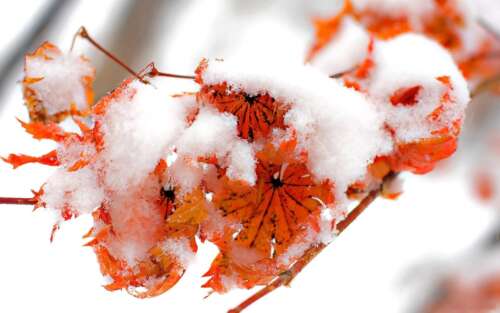
As fall starts to wind down and winter quickly approaches, many adjustments need to be made. This can mean adjustments to sleep patterns, dietary patterns, activity levels and more. Mentally, many people struggle with this time of year. In late autumn, there is a cold nip in the air. The days become shorter and we find ourselves a little more serious and less carefree than in the summer months.
Autumn marks the beginning of the yin cycle when daylight lasts less than twelve hours. It’s a time of harvest, when we gather colorful fruits and vegetables for winter storage. Pumpkins and squash symbolize abundance and we prepare wood for the fire while bringing out warm clothes for the colder, darker days of winter.
In East Asian Medicine (EAM), autumn is associated with the element of metal, governing organization, order, communication, the mind, setting limits and protecting boundaries. It’s an ideal time to finish projects initiated in spring and summer and reap the rewards of your hard work. It’s also perfect for starting introspective, indoor projects. Winter is associated with the element of water, the emotion of fear, the virtues of courage and wisdom and it is the time of year when you are supposed to slow down and conserve energy.
During the summer, ruled by the fire element, we engage more with the external world, traveling and enjoying outdoor activities. Autumn, however, is a time for organizing your life for the winter and turning inward for reflection.
The lung and large intestine are the internal organs related to fall and the metal element. The lung is associated with the emotion of letting go, which can be challenging for those who love summer. Extra support from regular acupuncture visits can help with this transition.
The kidney and urinary bladder are the organ systems that belong to winter and the water element. Likewise, both play an important role in fluid regulation. In EAM, the kidneys are the storehouse of our vital energy and our Jing, or Essence. Jing relates to our genetics and governs growth, reproduction and how we move through the cycles of life. Our bones, joints, teeth, ears, brain and marrow are influenced by the kidneys. The kidneys ignite all processes and functions within the entire body, mind and spirit. They provide the driving qi – energy and will power – needed to overcome obstacles and press forward to accomplish our goals in life and live out our fullest potential. We draw upon the energy reserves of the kidneys just by the virtue of living, working and aging.
The urinary bladder is compared to a reservoir where the waters of the body collect. Physical signs of imbalance include back pain, bladder pain, vertigo and headaches, vision issues and urinary incontinence. Due to this organs’ role of holding on to urine, emotional signs of imbalance relate to this “holding on”: grudges and jealousy, in addition to fear.
You may find yourself seeking ways to release emotional and physical issues as we transition from fall into winter. Acupuncture, Chinese herbal medicine and qigong can be perfect solutions. Correct qigong practice can increase vitality, extend your lifespan and prevent disease, making it a valuable skill to learn as summer gives way to fall.
Sleep is another important aspect of staying healthy during this transition. Ancient Chinese medical texts advise going to bed early and rising with the sounds of the rooster. Also, getting outside with the sunrise is extremely beneficial. Even if it is cold outside, the early morning sunshine can help keep your circadian rhythm functioning properly.
To maintain a tranquil body and spirit, it’s essential not to give in to unfulfilled desires. Consider avoiding social media or limiting time spent online, as it can easily trigger emotions.
The lungs, considered a fragile organ in EAM, are the uppermost organ susceptible to wind and cold. Dress appropriately for the changing weather and keep your neck covered. Lungs control the circulation of the defensive qi, protecting you from flu, colds and other illnesses.
Fall moves to winter and metal transitions to water. With the seasonal transition of metal to water, we have to be aware of the emotion that water will bring if we are not in balance, which is fear. The human mind is wired to be aware of negative possibilities to help it navigate life and remain safe. Because the body only knows threat or non-threat, when the mind’s overrun with too many possibly negative unknowns, the body begins responding to untrue outcomes.
During this seasonal transition, help yourself understand that you are safe by breathing deep and staying warm and malleable. Allow your lungs and large intestine to gather and provide the nutrients for a solid foundation. To avoid constriction or stagnation in the flow of the body, eat warming foods like cinnamon, ginger, turmeric, cardamom, garlic, onion, and Chinese yam. Also avoid eating excess cold and raw foods or excessive dairy products. And instead of restricting the lungs with fear-induced shallow breathing, become nutritionally prepared for winter by breathing deep this season.
Utilizing all the recommendations mentioned above can help you remain happy and healthy during the transition from fall to winter. And if you need some extra help, don’t think twice about scheduling an acupuncture session.

